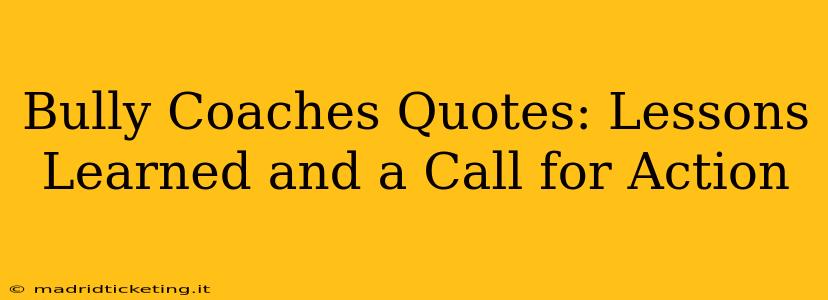The world of sports, often lauded for its values of teamwork, discipline, and fair play, can unfortunately also be a breeding ground for abusive behavior. Coaches, entrusted with shaping young athletes, sometimes cross the line, employing bullying tactics that inflict lasting emotional and psychological damage. Analyzing quotes attributed to "bully coaches" – those who use intimidation, verbal abuse, and humiliation to control their athletes – unveils unsettling patterns and crucial lessons. This article will explore some of these quotes, dissect their harmful implications, and ultimately call for a fundamental shift in coaching culture.
What are some examples of quotes from bully coaches?
While pinpointing exact quotes attributed to specific bully coaches is difficult due to privacy concerns and the often clandestine nature of abuse, we can analyze typical phrases and sentiments that characterize their behavior. These often aren't explicitly malicious but subtly convey a culture of fear and control. Examples include:
- "You're weak. You don't belong here." This quote directly attacks an athlete's self-worth and belonging, undermining their confidence and creating a climate of fear.
- "If you can't handle this pressure, you're not cut out for this sport." This statement pressures athletes to endure unhealthy levels of stress and implies that mental health is irrelevant to athletic success.
- "I'm pushing you because I believe in you. You'll thank me later." While superficially positive, this justifies abusive behavior under the guise of tough love, ignoring the athlete's emotional well-being.
- "Don't be a crybaby. Toughen up." This dismissive statement invalidates the athlete's feelings and promotes a culture of stoicism that can mask serious underlying issues.
- "You're embarrassing the team." Public humiliation designed to shame athletes into conforming.
These seemingly innocuous phrases, when repeated and coupled with other forms of abuse, create a toxic environment where athletes fear speaking up, even when facing mistreatment.
How do bully coaches' quotes impact athletes?
The long-term effects of verbal abuse and intimidation from coaches can be devastating. These experiences can lead to:
- Low self-esteem: Constant criticism and humiliation erode self-confidence and self-worth.
- Anxiety and depression: The constant pressure and fear can lead to significant mental health issues.
- Post-traumatic stress disorder (PTSD): Severe cases of bullying can result in PTSD, impacting daily life.
- Eating disorders: The pressure to achieve specific body types can contribute to the development of eating disorders.
- Substance abuse: Athletes may turn to substance abuse as a coping mechanism.
What are the signs of a bully coach?
Recognizing the signs of a bully coach is crucial for preventing further harm. Look out for:
- Excessive yelling and verbal abuse: Frequent outbursts and belittling remarks.
- Humiliation and public shaming: Embarrassing athletes in front of teammates or others.
- Unrealistic expectations: Demanding perfection and punishing minor mistakes harshly.
- Isolation and intimidation: Creating a culture of fear where athletes are afraid to speak up.
- Physical abuse or threats of physical abuse: While less common, this is a serious violation.
What can be done to stop bully coaches?
Addressing the issue of bully coaches requires a multi-pronged approach:
- Athlete empowerment: Athletes must feel safe reporting abuse without fear of retaliation. Organizations need clear and accessible reporting mechanisms.
- Coach education: Coaching courses should incorporate modules on ethical conduct, emotional intelligence, and positive coaching techniques.
- Parental involvement: Parents should be vigilant and actively involved in their children's athletic experiences.
- Zero-tolerance policies: Sports organizations must adopt and enforce strict zero-tolerance policies against all forms of abuse.
- Independent investigations: Allegations of abuse must be thoroughly investigated by independent bodies.
What role do parents play in addressing the issue?
Parents play a vital role in protecting their children from bully coaches. They should:
- Communicate openly with their children: Create a safe space for children to share their experiences.
- Observe practices and games: Be present and attentive to the coach's behavior.
- Report any suspicions of abuse: Do not hesitate to report any concerns to the appropriate authorities.
- Support their children's emotional well-being: Provide the necessary support and resources to help children cope with any trauma.
The pervasive problem of bully coaches necessitates a collective effort. By fostering a culture of respect, promoting ethical coaching practices, and empowering athletes and parents to speak up, we can create a safer and healthier sporting environment for all. Silence is complicity; we must all actively work to eradicate this harmful behavior.

